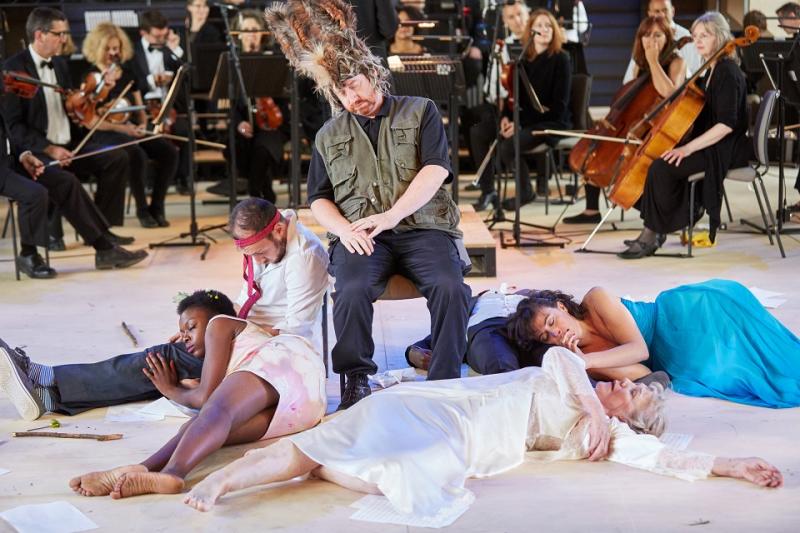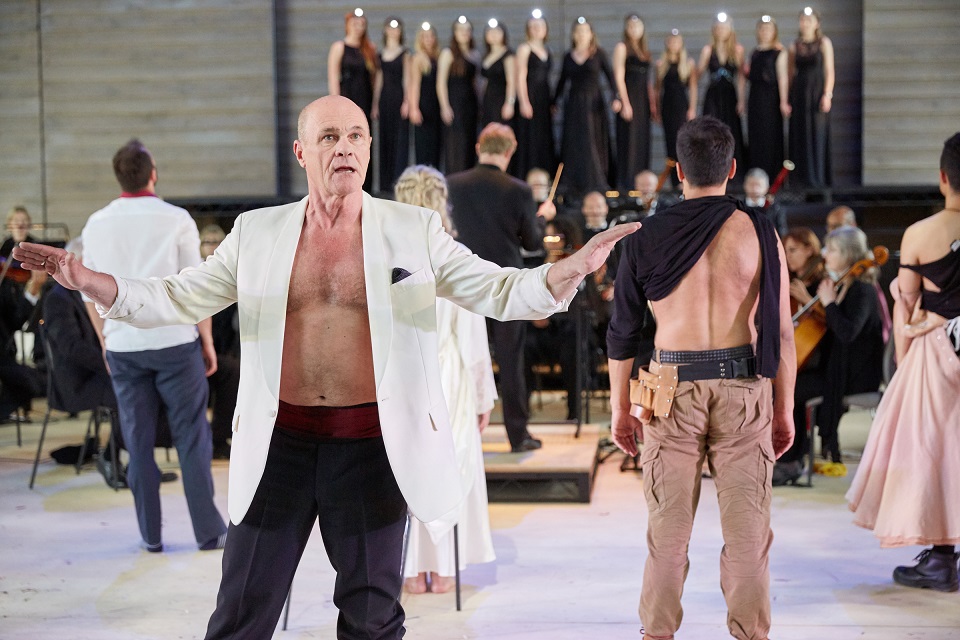A Midsummer Night's Dream, Garsington Opera | reviews, news & interviews
A Midsummer Night's Dream, Garsington Opera
A Midsummer Night's Dream, Garsington Opera
Shakespeare filleted but partly fleshed back out by Mendelssohn's lovely music

We’re so used these days to theatre music as aural torture – blasts of pop music on the tannoy, assorted electronics or, if you’re (moderately) lucky, a snatch of too-loud Chopin or Grieg before the lights come up on the Ibsen drawing-room – that it’s easy to forget a time when plays were introduced, interrupted and even accompanied by a pit orchestra playing music specially composed by the greatest composers of the day.
But there’s a good case for occasionally putting it back where it belongs; and that’s exactly what Garsington and the Royal Shakespeare Company have done in rematching Mendelssohn’s well-known Midsummer Night’s Dream music to the even better-known play for which it was composed. It’s a nice idea, but one that needs care, care over pacing and balance, matters of style, and even crude material issues such as duration and acoustics, especially in a theatre like Garsington’s open plan demountable, with its high roof, steep rake, and flat, featureless back wall. Owen Horsley’s production goes from here to the Queen Elizabeth Hall, then on to Stratford, very different environments with, no doubt, problems of their own. Maybe it was conceived for one or other of them. It wasn’t, I’d be prepared to bet, thought out in terms of Garsington, except perhaps in one somewhat damaging respect.
This, it tells us, is how they did it then, only, of course, it isn’tAs a production of Shakespeare’s comedy, it hardly rates at all. In order to fit a timing that suits us raving picnickers, the text is cut to a severe two hours, including the leisurely half-hour or so of unattached Mendelssohn (which at Potsdam in 1843 would have been played with the curtain down). So scene after scene is filleted to the point where the actors have little or no chance to establish character, let alone relationships, in this play about the frailty and provisionality of love. Somehow they keep their place. But as for delivery, it’s a matter of getting through, if necessary by shouting in order to silence the lack of refinement, or dashing hither and thither like the White Rabbit, forever consulting his watch.
 The result is more a demonstration than a performance. This, it tells us, is how they did it then. Only, of course, it isn’t. With the orchestra on the stage, the music grabs our attention more than it might have done in an age when music was part of the décor. In this particular case that’s no bad thing, because Mendelssohn’s music is exquisite, fits the play like a glove, and comes to vivid life as played and sung by the Garsington Opera Chorus and Orchestra under Douglas Boyd. In this context it’s balm to the ears. It ought, though, to vanish into the play, not have to compensate for it.
The result is more a demonstration than a performance. This, it tells us, is how they did it then. Only, of course, it isn’t. With the orchestra on the stage, the music grabs our attention more than it might have done in an age when music was part of the décor. In this particular case that’s no bad thing, because Mendelssohn’s music is exquisite, fits the play like a glove, and comes to vivid life as played and sung by the Garsington Opera Chorus and Orchestra under Douglas Boyd. In this context it’s balm to the ears. It ought, though, to vanish into the play, not have to compensate for it.
Hard in the circumstances to say too much about the cast. David Rintoul (pictured above, as Oberon) and Marty Cruickshank double as Theseus/Oberon and Hippolyta/Titania respectively, an elderly pair who might well have gone through the trials that Shakespeare rather oddly details. As fairies they hardly cut the mustard-seed but do achieve a certain strident dignity as ruling class.
The four lovers, by contrast, are barely on stage long enough for proper identification, even possibly in their own minds. Oliver Johnstone provides touches of magic as Puck, but also a good deal of gratuitous arm-waving as sub-orchestral conductor, a device that should long ago have been put away in the dressing-up basket. Best are the mechanicals, including a brilliant Flute/Thisby from Chris Lew Kum Hoi, thick lipstick and all, and a genuinely comic Bottom in Forbes Masson. These, at least, are players one would like to see and hear unedited.
The future of Arts Journalism
You can stop theartsdesk.com closing!
We urgently need financing to survive. Our fundraising drive has thus far raised £49,000 but we need to reach £100,000 or we will be forced to close. Please contribute here: https://gofund.me/c3f6033d
And if you can forward this information to anyone who might assist, we’d be grateful.

Subscribe to theartsdesk.com
Thank you for continuing to read our work on theartsdesk.com. For unlimited access to every article in its entirety, including our archive of more than 15,000 pieces, we're asking for £5 per month or £40 per year. We feel it's a very good deal, and hope you do too.
To take a subscription now simply click here.
And if you're looking for that extra gift for a friend or family member, why not treat them to a theartsdesk.com gift subscription?
more Theatre
 Hamlet, National Theatre review - turning tragedy to comedy is no joke
Hiran Abeyeskera’s childlike prince falls flat in a mixed production
Hamlet, National Theatre review - turning tragedy to comedy is no joke
Hiran Abeyeskera’s childlike prince falls flat in a mixed production
 Rohtko, Barbican review - postmodern meditation on fake and authentic art is less than the sum of its parts
Łukasz Twarkowski's production dazzles without illuminating
Rohtko, Barbican review - postmodern meditation on fake and authentic art is less than the sum of its parts
Łukasz Twarkowski's production dazzles without illuminating
 Lee, Park Theatre review - Lee Krasner looks back on her life as an artist
Informative and interesting, the play's format limits its potential
Lee, Park Theatre review - Lee Krasner looks back on her life as an artist
Informative and interesting, the play's format limits its potential
 Measure for Measure, RSC, Stratford review - 'problem play' has no problem with relevance
Shakespeare, in this adaptation, is at his most perceptive
Measure for Measure, RSC, Stratford review - 'problem play' has no problem with relevance
Shakespeare, in this adaptation, is at his most perceptive
 The Importance of Being Earnest, Noël Coward Theatre review - dazzling and delightful queer fest
West End transfer of National Theatre hit stars Stephen Fry and Olly Alexander
The Importance of Being Earnest, Noël Coward Theatre review - dazzling and delightful queer fest
West End transfer of National Theatre hit stars Stephen Fry and Olly Alexander
 Get Down Tonight, Charing Cross Theatre review - glitz and hits from the 70s
If you love the songs of KC and the Sunshine Band, Please Do Go!
Get Down Tonight, Charing Cross Theatre review - glitz and hits from the 70s
If you love the songs of KC and the Sunshine Band, Please Do Go!
 Punch, Apollo Theatre review - powerful play about the strength of redemption
James Graham's play transfixes the audience at every stage
Punch, Apollo Theatre review - powerful play about the strength of redemption
James Graham's play transfixes the audience at every stage
 The Billionaire Inside Your Head, Hampstead Theatre review - a map of a man with OCD
Will Lord's promising debut burdens a fine cast with too much dialogue
The Billionaire Inside Your Head, Hampstead Theatre review - a map of a man with OCD
Will Lord's promising debut burdens a fine cast with too much dialogue
 50 First Dates: The Musical, The Other Palace review - romcom turned musical
Date movie about repeating dates inspires date musical
50 First Dates: The Musical, The Other Palace review - romcom turned musical
Date movie about repeating dates inspires date musical
 Bacchae, National Theatre review - cheeky, uneven version of Euripides' tragedy
Indhu Rubasingham's tenure gets off to a bold, comic start
Bacchae, National Theatre review - cheeky, uneven version of Euripides' tragedy
Indhu Rubasingham's tenure gets off to a bold, comic start

Add comment